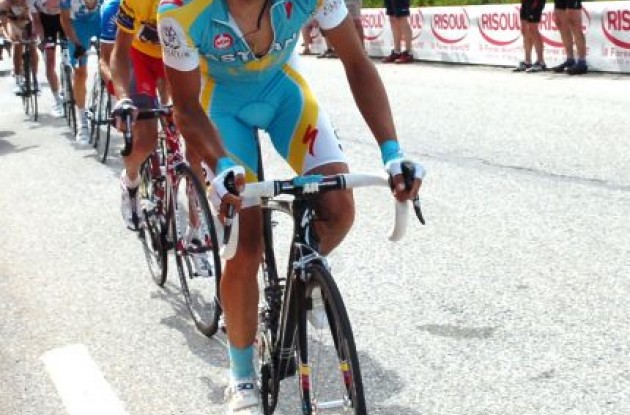Source: Plastic Residue Found in Alberto Contador's System
Latest report points to Spaniard having a blood transfusion.
A urine sample taken from three-time Tour de France winner Alberto Contador showed abnormally high levels of plastic residues that could indicate he received a transfusion of his own blood during this year's race, a person with knowledge of the test results told AP earlier today.
Contador, who has previously denied receiving a transfusion, was provisionally suspended by the international cycling federation last week after a small amount of the banned drug clenbuterol was discovered in one of his samples by a laboratory in Cologne, Germany. The Spanish rider blamed contaminated beef for the result.
The Cologne lab also found plastic traces that might turn up after a transfusion of blood from a plastic bag, according to the person, who spoke to the AP on condition of anonymity because Contador's investigation by the UCI is ongoing.
Contador's abnormal sample showed eight times the normal amount of the plasticizer, the person said.
Contador has denied he underwent a blood transfusion before a grueling mountain stage on July 22.
His spokesman, Jacinto Vidarte, on Tuesday denied any plastic residues were found in the tests.
"We are not aware of any findings of this plastic substance in any of the tests," Vidarte said. "We - officially and unofficially - have no information on anything to do with this. There were no traces of plastic in any of the tests."
The plasticizer test result was also reported last week by French sports daily L'Equipe and German television network ARD. The New York Times reported on the finding Tuesday.
The person who spoke to AP would not confirm whether the plasticizer was detected in a test on July 20 or July 21.
The UCI said the clenbuterol was detected on July 21, the Tour de France 2010's final rest day. The Times quoted an anonymous source as saying the plastic residues were detected in a separate test on the previous day.
UCI spokesman Enrico Carpani told the AP on Tuesday that the cycling body was working with the World Anti-Doping Agency to analyze the elements of Contador's case. He said the UCI would not comment further, citing confidentiality rules.
Contador has been provisionally suspended by the UCI and will lose his Tour de France title if he is convicted of doping. He also risks a two-year suspension.
A detection method for self-blood transfusion has yet to be fully validated, but WADA director general David Howman told the AP last week that "its use for anti-doping purposes is partially validated and evidence from it, among others, can be used before tribunals."
Cycling and WADA officials also have the possibility of storing Contador's samples for years and retesting them once the detection method is validated.
Contador has challenged cycling authorities to freeze his urine and blood samples until technology can show he rode clean in this year's race.
Experts in blood doping say people who undergo intravenous blood transfusions for medical reasons or blood doping to increase performance are potentially exposed to the plasticizer di-(2-ethylhexyl)phthalate (DEHP) found in intravenous bags.
Experts say professional riders who cheat with blood transfusions generally receive them before big mountain stages. A French expert working for the French anti-doping agency, professor Michel Rieu, said last month that the combined use of self-blood transfusion and micro-doses of the latest generation of blood-booster EPO is common in cycling.
A scientific study recently published by Spanish experts evaluated the exposure to DEHP by measuring the plasticizer metabolites in selected groups of subjects. It found that concentrations in urine of all three metabolites are significantly higher in people receiving blood transfusions.








